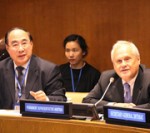
An expert-level, interactive panel on “The Independent Oversight Role of Supreme Audit Institutions in Implementing the Post-2015 Development Agenda” was organized by UN DESA’s Division for Public Administration and Development Management (DPADM) in New York on 21 January in collaboration with the Permanent Missions of Austria, the Kingdom of Morocco, and the Republic of Korea.
The panel discussed how the United Nations and Member States can support the supreme audit institutions (SAIs) in promoting efficient, accountable, effective and transparent public administration and governance in achieving nationally and internationally agreed development goals, in the context of the post-2015 development agenda. Furthermore, the panel considered how the independence of SAIs and related capacity-building needs as well as the improvement of public accounting systems could be instrumental in implementing the post-2015 development agenda.
In his opening remarks, the Chair of the event, Mr. Martin Sajdik, Permanent Representative of Austria and President of the Economic and Social Council, highlighted the recent GA resolution A/RES/69/228 which acknowledged the important role of supreme audit institutions in promoting the efficiency, accountability, effectiveness and transparency of public administration.
He stressed that the resolution acknowledged the role of SAIs in fostering governmental accountability for the use of resources and their performance in achieving development goals. He cited the recent Secretary-General’s Synthesis Report which “underscores the critical role of review and monitoring frameworks, drawing attention to national oversight mechanisms, such as supreme audit institutions and oversight functions by legislature.”
Mr. Wu Hongbo, Under-Secretary-General for Economic and Social Affairs, further drew on the Secretary-General’s Synthesis Report, emphasizing the critical role of monitoring frameworks, including oversight mechanisms such as SAIs and oversight functions by the legislature. Speaking of lessons learned from the last fifteen years of the Millennium Development Goals (MDGs), Mr. Wu observed that “Country experience has demonstrated that where there is accountability of public institutions, there are better results on the ground in public service delivery, in areas such as education, health care, water and sanitation and women’s participation, among others.”
Moving forward, he views SAIs as playing an even more important role in supporting the implementation of the Sustainable Development Goals, which are broader in scope, with a specific goal and related targets on inclusive and accountable institutions.
In his keynote speech, Mr. Josef Moser, Secretary-General of International Organization of Supreme Audit Institutions (INTOSAI), noted the longstanding cooperation between INTOSAI and the UN. He acknowledged the important role played by the UN in strengthening INTOSAI as an organization and in reinforcing capacities of its country SAI members. He then highlighted the GA resolution A/RES/69/228 which “encourages Member States to give due consideration to the independence and capacity building of SAIs, as well as to the improvement of public accounting systems in the context of the post-2015 development agenda.”
Mr. Moser also mentioned a series of obstacles that impede national SAIs in the conduct of their duties, especially the lack of legal, financial and organizational independence of SAIs from governments, the lack of a comprehensive mandate to audit government performance, and the lack of possibilities to provide a formal audit opinion on government accounts. To remedy the situation, he mentioned increasing the independence and capacity building of SAIs, as well as the harmonization of accounting systems and standards nationally and internationally.
Mr. Oh Joon, Permanent Representative of the Republic of Korea, noted the role of capable institutions in his address, based on the foundation of good governance and the rule of law, as key for sustainable development and the post-2015 development agenda. Reflecting on the experience of his own country, Ambassador Oh underscored the importance of “intangible infrastructure, such as good governance and effective institutions”, which is “just as important as tangible resources” in the development process. He then noted the importance of INTOSAI’s role in facilitating collaboration among supreme audit institutions at the national, regional, and international levels. He encouraged INTOSAI to continue to be a significant contributor to improving public accountability, including in the context of the post-2015 development agenda.
Mr. Abderrazak Laassel, Deputy Permanent Representative of the Kingdom of Morocco, emphasized “monitoring, accountability, efficiency and transparency at all levels and stages in the use of funds and different sources of financing for development, is the best guaranty to achieve tangible and better results for development.” Drawing from the experience of his country, Mr. Laassel noted the necessary collaboration among audit institutions at both local and national levels. He noted that the Moroccan constitution of 2011 entrusted the Court of Audit with the mission of “protector of the principles and values of good governance, transparency and accountability”. Mr. Laassel also reiterated the critical role that the supreme audit institutions and their independence play in ensuring efficient and transparent use of resources.
During the ensuing discussion, a question was raised on the preconditions observed by SAIs for channeling and safeguarding financial resources to achieve the proposed SDGs. The answers highlighted the need to move from cash to accrual accounting and from financial to performance audits. In addition, a question was posed on how SAIs can share the lessons learned from reviewing the performance of implementing the MDGs.
The answers emphasized the need to include INTOSAI and national SAIs in looking at the indicators for the implementation of SDGs at the international level. In addition, SAIs can give advice in looking at financing options at the forthcoming 3rd International Conference on Financing for Development. In addition, Under-Secretary-General Wu invited delegates to incorporate role of SAIs in the elaboration of the post-2015 development agenda, especially in review and monitoring.
